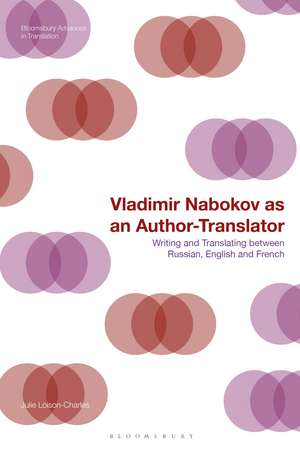Vladimir Nabokov as an Author-Translator: Writing and Translating between Russian, English and French: Bloomsbury Advances in Translation
Autor Dr Julie Loison-Charlesen Limba Engleză Paperback – 26 iun 2024
| Toate formatele și edițiile | Preț | Express |
|---|---|---|
| Paperback (1) | 192.48 lei 43-57 zile | |
| Bloomsbury Publishing – 26 iun 2024 | 192.48 lei 43-57 zile | |
| Hardback (1) | 570.02 lei 43-57 zile | |
| Bloomsbury Publishing – 14 dec 2022 | 570.02 lei 43-57 zile |
Din seria Bloomsbury Advances in Translation
- 23%
 Preț: 192.55 lei
Preț: 192.55 lei - 22%
 Preț: 257.03 lei
Preț: 257.03 lei - 21%
 Preț: 218.74 lei
Preț: 218.74 lei - 22%
 Preț: 225.24 lei
Preț: 225.24 lei - 22%
 Preț: 256.20 lei
Preț: 256.20 lei - 23%
 Preț: 198.30 lei
Preț: 198.30 lei - 22%
 Preț: 230.79 lei
Preț: 230.79 lei - 14%
 Preț: 197.77 lei
Preț: 197.77 lei - 22%
 Preț: 238.22 lei
Preț: 238.22 lei - 22%
 Preț: 259.34 lei
Preț: 259.34 lei - 23%
 Preț: 198.30 lei
Preț: 198.30 lei -
 Preț: 217.62 lei
Preț: 217.62 lei - 13%
 Preț: 257.03 lei
Preț: 257.03 lei - 13%
 Preț: 263.62 lei
Preț: 263.62 lei - 30%
 Preț: 569.06 lei
Preț: 569.06 lei - 13%
 Preț: 238.94 lei
Preț: 238.94 lei - 13%
 Preț: 181.77 lei
Preț: 181.77 lei - 30%
 Preț: 598.45 lei
Preț: 598.45 lei - 22%
 Preț: 239.02 lei
Preț: 239.02 lei - 23%
 Preț: 197.86 lei
Preț: 197.86 lei - 22%
 Preț: 256.59 lei
Preț: 256.59 lei - 11%
 Preț: 344.52 lei
Preț: 344.52 lei - 23%
 Preț: 191.04 lei
Preț: 191.04 lei - 24%
 Preț: 189.70 lei
Preț: 189.70 lei - 22%
 Preț: 258.42 lei
Preț: 258.42 lei - 13%
 Preț: 256.59 lei
Preț: 256.59 lei - 13%
 Preț: 257.12 lei
Preț: 257.12 lei
Preț: 192.48 lei
Preț vechi: 249.97 lei
-23% Nou
Puncte Express: 289
Preț estimativ în valută:
36.84€ • 40.03$ • 30.97£
36.84€ • 40.03$ • 30.97£
Carte tipărită la comandă
Livrare economică 21 aprilie-05 mai
Preluare comenzi: 021 569.72.76
Specificații
ISBN-13: 9781350243361
ISBN-10: 1350243361
Pagini: 280
Dimensiuni: 156 x 234 x 25 mm
Greutate: 0.4 kg
Editura: Bloomsbury Publishing
Colecția Bloomsbury Academic
Seria Bloomsbury Advances in Translation
Locul publicării:London, United Kingdom
ISBN-10: 1350243361
Pagini: 280
Dimensiuni: 156 x 234 x 25 mm
Greutate: 0.4 kg
Editura: Bloomsbury Publishing
Colecția Bloomsbury Academic
Seria Bloomsbury Advances in Translation
Locul publicării:London, United Kingdom
Caracteristici
Moves the conversation beyond the usual focus on Russian-English self-translation to cast light on the impact of pseudotranslation and his own vision and ethics of writing and translation
Notă biografică
Julie Loison-Charles is a Lecturer in Translation Studies at Lille University, France and the President of the French Vladimir Nabokov Society.
Cuprins
IntroductionPART I. Nabokov and Pseudotranslation1. At the Crossroads of Translation and Literature2. Intertextual Links between Pseudotranslations and Nabokov's Work3. Translating Pseudotranslations4. Nabokov's Pseudotranslations5. Are Nabokov's Novels in English 'Pseudotranslations'?PART II. Nabokov and the Author Behind the Translator6. Vladimir Nabokov's Translation Theory for Eugene Onegin7. Eugene Onegin, a Translation into Nabokovese? 8. Investigating Nabokov's Literalism, from Chateaubriand to Venuti9. Nabokov's Eugene Onegin, or the Reshaping of the Russian Canon in the World Republic of LettersPART III. Nabokov as a French Self-Translator10. Collaborative Translation as Mediated Self-Translation11. Nabokov and his Collaborators12. Nabokov's Creative Involvement in French13. Should Nabokov Be Retranslated?ConclusionReferencesIndex
Recenzii
Throughout, Loison-Charles's analyses are meticulous and detailed. She concludes her book with an eloquent argument for retranslating some of Nabokov's major works-perforce now without his lively but petulant assistance. For readers who value Nabokov first and foremost as a verbal phenomenon-and it is hard to countenance for long any other approach-Vladimir Nabokov as an Author-Translator should be essential reading.
In its depth, breadth, and scope, Loison-Charles's book is unparalleled. This is a theoretically sophisticated, scholastically informed, and archival-research-fortified study of Nabokov's translations across languages and traditions. Neither apologetic nor critical in its approach, this is an exemplary exercise in even-handed analysis. Erudite in its syntheses, illuminating in its implications, it is also - helpfully, refreshingly - witty. Most important, of course, it offers an informed, and sensitive treatment of the entire Eugene Onegin project.
Loison-Charles provides a fascinating exploration of Vladimir Nabokov's theories and practices of translation, both of other's works and his own. Bolstering her analysis with Nabokov's unpublished correspondence with translators, Loison-Charles skillfully highlights the changing strategies Nabokov deployed to ensure that his artistic vision was accurately conveyed to new audiences.
In its depth, breadth, and scope, Loison-Charles's book is unparalleled. This is a theoretically sophisticated, scholastically informed, and archival-research-fortified study of Nabokov's translations across languages and traditions. Neither apologetic nor critical in its approach, this is an exemplary exercise in even-handed analysis. Erudite in its syntheses, illuminating in its implications, it is also - helpfully, refreshingly - witty. Most important, of course, it offers an informed, and sensitive treatment of the entire Eugene Onegin project.
Loison-Charles provides a fascinating exploration of Vladimir Nabokov's theories and practices of translation, both of other's works and his own. Bolstering her analysis with Nabokov's unpublished correspondence with translators, Loison-Charles skillfully highlights the changing strategies Nabokov deployed to ensure that his artistic vision was accurately conveyed to new audiences.
